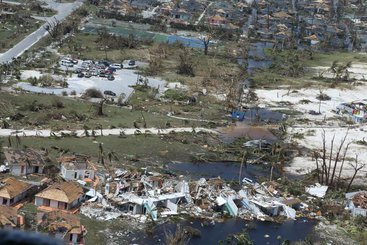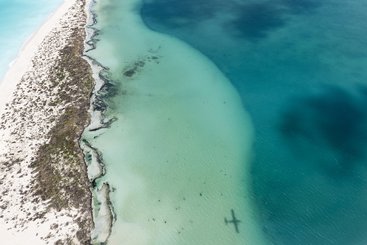Small Island Developing States (SIDS) contribute less than 1% of global greenhouse gas (GHG) emissions, but are baring the full brunt of the climate crisis and are struggling to make progress across all SGDs.
SIDS face more frequent and intense storms, longer droughts, salinisation of fresh water, and loss of habitats and livelihoods due to climate change; and sea-level rise may make low-lying atoll states uninhabitable within decades. Yet repeated climate change conferences have failed to produce a formula that links impacts, liability and compensation. There is still no agreement on a Loss and Damage finance facility to help vulnerable countries like SIDS deal with the irrevocable consequences of climate change.
A changing climate is only part of the problem. Many islands already suffered from high levels of environmental degradation and vulnerability to hazards, due in part to extractive and exploitative land use, labour and agricultural practices that date back to the colonial period. These structural vulnerabilities are difficult to reverse – but calls for a fairer and more responsible use of the environment in SIDS are growing. This includes international waters, or areas beyond national jurisdiction. The fear is that technologically advanced economies will exploit and destroy deep sea environments leaving SIDS – which rely on the ocean ecosystem for fisheries and tourism – to deal with the aftermath and lost opportunities. SIDS participation in the development of a new international agreement to manage the high seas – the Biodiversity Beyond National Jurisdictions (BBNJ) agreement – is critical.
Environmental justice is about a fair sharing of environmental rights and duties and the recognition of special vulnerabilities of groups or states because of historic injustices, limited resources and greater exposure to economic or environmental shocks. It also recognises the structural inequalities rooted in global systems of aid, finance, trade and governance. For example, international trade is increasingly regulated through non-tariff measures such as product standards and quality. This disadvantages small economies which lack the capacity to meet these standards.
And while SIDS need global temperatures to be kept below 1.5°C for their environmental survival; low-carbon transitions also threaten their economic survival. Environmental border tax adjustment measures make their exports less competitive, while emissions reduction treaties and industry standards for the aviation and maritime sectors threaten tourism and increase the cost of SIDS’ exports.
Making the case for environmental justice
SIDS need support in their efforts to shift the positions of those who refuse to acknowledge the links between climate and environmental impacts, liability and compensation. In particular, they need assistance to:
- Identify, substantiate and call attention to the global legal, economic, and political injustices that are usurping their environmental rights.
- Create a system that moves away from arbitrary donations and charity towards just and adequate compensation.
- Facilitate dialogue and cooperation between large emitters and SIDS on environmental rights and duties. Non-judicial approaches to addressing climate-related loss and damage, known as restorative justice, present an alternative to the deadlock on Loss and Damage within the climate negotiations.
The Resilient and Sustainable Islands Initiative (RESI), ODI’s global advisory network, will help increase SIDS’ capacity to advocate for environmental justice on issues of trade, climate change, environmentally triggered migration, energy and water security. SIDS are being treated unfairly, but the precedents set for them will one day matter for all states, large and small. By helping SIDS to make their case for environmental justice, RESI will support investment in the sustainable future of the entire planet.



